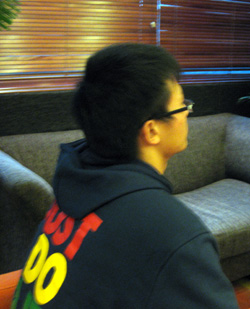Son of AIDS victims works to raise awareness
"I want to contribute to the community by helping other children whose families have been wretched by HIV/AIDS," said 23-year-old Xiaoleizi, a tall, slim young man who declined to give his real name.
|
|
|
Xiaoleizi, a 23-year-old young man whose parents are both AIDS patients, shared his bitter sweet story with China.org.cn on the eve of World AIDS Day. [China.org.cn] |
Xiaoleizi graduated this past July from a college located in Zhengzhou, the capital city of Henan Province. He is now a paid employee at the Henan agency of the Chi Heng Foundation (CHF), a registered charity from Hong Kong. The charity's mission is to create a harmonious, equal and healthy society through projects that provide education and promote AIDS prevention, care and anti-discrimination. Xiaoleizi brought six AIDS orphans with him to Beijing, to raise HIV/AIDS prevention awareness among the public and to encourage people to help HIV/AIDS victims and their families.
"CHF helped me finish my high school and college education. I appreciated it so much that I decided to do something to help more children like me the day I was admitted to college," said Xiaoleizi, candidly and humbly, impressing people with his unswerving resolution and optimism.
Born to a poor family in a village in Henan Province, Xiaoleizi has experienced what is unthinkably painful for many people. Like many poor villagers in the early 1990s, his parents were infected with HIV when they sold blood to unauthorized purchasing stations. "My family was very poor, and my parents had to sell blood to support me and my three elder sisters." His mother wasn't diagnosed as an AIDS patient until 2001, although his father got the diagnosis much earlier, he said.
Following a ban on imported blood products in the 1980s, thousands of blood plasma collection stations were established around the country, many of which were concentrated in poor, rural areas. Illegal blood collection has been the primary source of the HIV/AIDS epidemic in Henan.
Due to his weakened immune system, Xiaoleizi's father also developed other diseases and died of lung cancer in 2004, when Xiaoleizi was a sophomore in high school. "It was such a shock to me. My family didn't tell me anything about my father's disease until one of my sisters returned home from work and said that he had at most one month to live," he said, his face slightly quivering.
"I must continue my education, and I have to fight. My sisters all quit school because they wanted me to receive a higher education, which they think may change my destiny," said Xiaoleizi with a small grin. The death of his father did not hold him back. "I had to move on, for the sake of my family," he pointed out.
That same year, Xiaoleizi applied to receive CHF's educational funds for AIDS orphans. Fortunately, he was approved for the next four years. According to Xiaoleizi, CHF paid for more than two-thirds of his education.
"The government has done a lot in HIV/AIDS prevention and treatment," said Xiaoleizi, "My mother can get free treatment and subsidies, and she is in a comparatively stable condition." He did not say the exact amount of healthcare payments he receives.
In 2003, the Chinese government launched China CARES (China Comprehensive AIDS RESponse), a community-based HIV treatment, care and prevention program. Pilot programs were launched in seven central Chinese provinces, providing more than 5,000 HIV/AIDS patients with free, domestically produced anti-retroviral drugs. The "Four Frees and One Care" policy was also announced in 2003, stating that free HIV treatment would become available to everyone in rural areas and poor people in urban areas. Many AIDS-affected families have since been lifted from the dilemmas of paying medical bills.
When asked whether his classmates knew his family's condition, he said that he had only talked about it with his teacher and one close friend. "Though I am healthy and normal, people may look at me in a weird way because of my family's AIDS background. Discrimination is likely, so I kept it a secret until the day I graduated."
A kind-hearted and enthusiastic young man, Xiaoleizi has participated in various activities to help HIV/AIDS patients. He organized several donations when he served as chairman of the Youth Volunteers Society at his college. He also joined CHF's 2008 Sichuan Earthquake Relief Program. "That made me feel good," he said, "at least I can do something for society in my own way."
Xiaoleizi told China.org.cn that in addition to providing financial assistance to the sponsored students, CHF also provides vocational training and placement referral to help them find a job. After three years of studying enterprise management, Xiaoleizi, like many of the graduates supported by CHF, became one of its paid staff. After work each day, he returns home to take care of his ailing mother who is 58 years old. "My greatest wish is to get married before she leaves," said Xiaoleizi.
The number of HIV-positive people in China is probably around 740,000, up from the estimated 700,000 who had the virus in 2007, China's health minister Chen Zhu said at the 5th Conference of International Cooperation Programmes on HIV/AIDS in China. According to Xinhua news agency, as of October 31 this year, China had recorded 319,877 HIV infections, 102,323 of which had developed into AIDS. China has had 49,845 AIDS deaths since it detected its first HIV infection in 1985.
 0 Comments
0 Comments








Comments